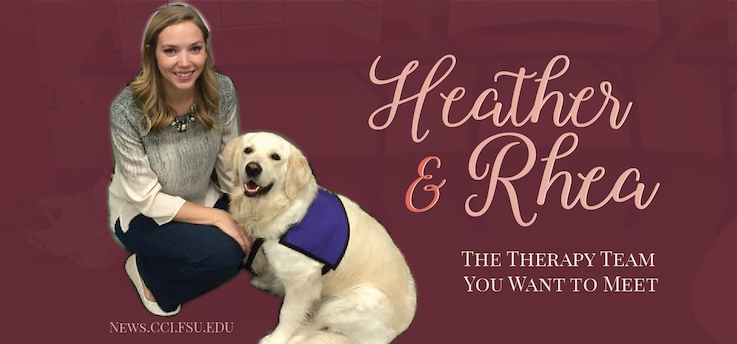Right around the time Heather Baum graduated from the Communication Science and Disorder‘s undergraduate program, she adopted an English Golden Retriever. As she transitioned into her graduate program, her new companion Rhea went along with her. What Heather didn’t know, was the impact her new dog would have on her budding career.
As an undergrad, Heather interned at the Communication and Early Childhood Research and Practice Center (CEC-RAP) as a research assistant under Dr. Juliann Woods. Their research focused on creating and sustaining relationships with families involved with the Kids Talk Tactics Project. Heather was president of Lambda Pi Eta, the honor society for the College of Communication and Information. Shortly before she graduated in 2013, she was inducted into the Seminole Torchbearer for her leadership on campus. Right around this time, Heather adopted puppy Rhea.

After her first year of graduate school came to a close, Heather looked into registering Rhea as a therapy dog after seeing how sweet and compassionate Rhea was with people of all ages. In the Communication Science and Disorder’s graduate program, research is required for graduation. Heather talked to Dr. Lisa Scott about using Rhea as a therapy animal and got the green light.
Research commenced during summer of 2014. Under Dr. Scott, Heather began bringing Rhea to weekly sessions
with a child diagnosed with an expressive/receptive language disorder. The child was also seen by graduate student Kelsey Hendershott, without a therapy animal. Data was gathered over the months, comparing the child’s performance between treatment conditions and following the child’s overall growth.
Heather shared her research during research rounds at the School of Communication Science and Disorders. Case Study of Animal Therapy With a Pediatric Client showed that the child made overall gains in both conditions, suggesting Animal-Assisted Therapy (AAT) is potentially beneficial in the area of speech therapy.
“Surprisingly, there has not been much current research on the subject of AAT in our field, so I was happy to contribute even in a small way!” said Heather.
Heather plans to graduate in August and will start work as a speech therapist for a private pediatric practice in her hometown of Fort Walton Beach. Rhea is along for the ride and Heather hopes to continue using Rhea as a tool to expand and encourage communication in children.

